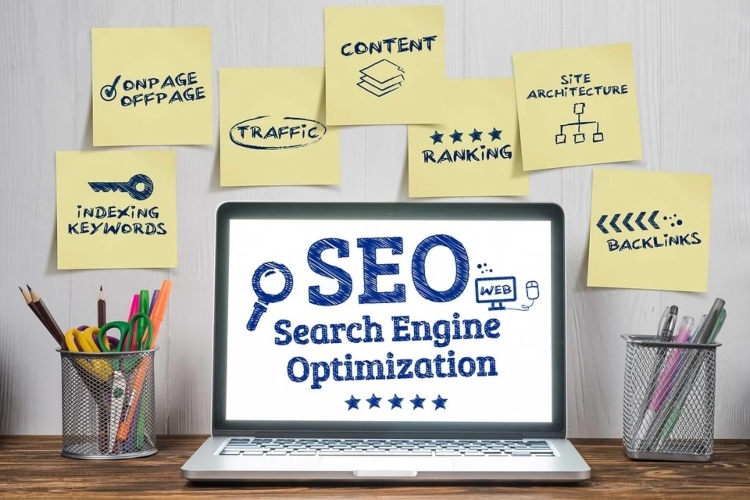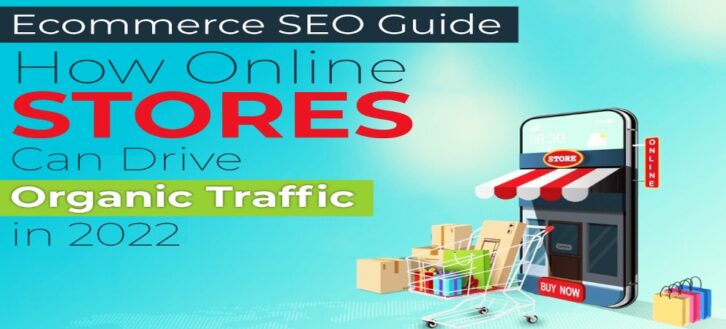What is Ecommerce SEO?
Ecommerce SEO means optimizing your online store for Google search to drive organic traffic to your website. There are two main reasons why Ecommerce SEO is essential:
The first reason is that organic traffic is one of the most valuable sources of traffic for online stores.
Organic traffic is viewers who find your store through a search engine like Google, without you having to pay for the click. It means they’re already interested in what you’re selling, making them much more likely to buy something from your store.
Studies have shown that organic traffic changes significantly faster than other traffic sources, like paid ads.
The second reason Ecommerce SEO is important is that it’s one of the most sustainable traffic sources. Once you rank in Google, you can expect consistent organic traffic to your store without paying for it continuously.

How to optimize your Ecommerce Store for SEO
There are a few key things you need to do to optimize your online store for Ecommerce SEO:
- Do keyword research to find the right keywords to target
- Optimize your website’s title tags, Meta descriptions, and header tags
- Create informative product pages with unique, keyword-rich content
- Build high-quality backlinks to your store from other websites
Are you ready to drive organic traffic to your online store?
If you’re ready to start optimizing your online store for SEO, contact an online store development Dhule like ours for help. We will help you to build a customized SEO strategy that helps you rank higher on Google and gain more organic traffic to your store.
Is Best SEO services that important to the business?
The answer is a big YES! Ecommerce SEO will be one of your top priorities if you want traffic and online business visibility. It’s essential for helping potential customers find your store and increasing your chances of making a sale.
Ecommerce experts can help you create an effective SEO strategy tailored to your business. Contact us today to get started!
Critical Online sales Strategies to drive organic traffic in 2022
Know Your Customer
The first step in any online sales strategy is understanding who your customer is. It includes knowing their demographics, interests, likes, and dislikes. Once you understand your target customer well, you can start creating content and marketing campaigns that appeal to them specifically.
Optimize Your Website
If you want to gain organic traffic for your online store, it’s essential to have a well-optimized website. It means your website should design for both users and search engines.
A few things you can do to optimize your website include:
- Make sure your website is mobile-friendly
- Ensure your website loads quickly with high-quality, keyword-rich content, well-written title tags, meta descriptions, and header tags
- Use SEO-Friendly URLs- Make sure to use SEO-friendly URLs when creating pages on your website. It means using keywords in your URLs to help your pages rank higher in search engine results pages.
- Invest in Content Marketing- Content marketing is one of the best online sales strategies for driving organic traffic to your store. It involves creating high-quality blog posts, infographics, videos, and other types of content that are relevant to your target customer. Not only will you rank higher in search results, but it will also help you build faith and authority with your target audience.
- Social media is another powerful online sales strategy for driving organic traffic to your store. Social media allows you to reach many potential customers quickly and easily. Social Media post interesting, engaging content regularly and use relevant hashtags to reach a wider audience. You will also try to run social media ads to target potential customers who are most likely to buy from your store.
- Analyze Your Results – Finally, regularly monitoring and analyzing your online sales strategy is essential. It will help you see what’s working and what’s not so you can make necessary changes to improve your results. You can use Google Analytics to know your website traffic and conversions.
- Invest in SEO- Investing in Ecommerce SEO is one of the best online sales strategies for driving organic traffic to your store. SEO can help you rank higher in search engine results pages, making it more likely for potential customers to find your store. Contact professional SEO consultant Nasik for assistance if you need help with your Ecommerce SEO.

Ultimate Tips to Best Ecommerce SEO
- Use high-quality content: Essential Ecommerce SEO tips. Your content must be well-written, keyword-rich, and informative if you want it to rank well in search results.
- Optimize your website: Your website should be designed for users and search engines. It means it should be mobile-friendly, fast-loading, and easy to navigate.
- Use relevant keywords: Keywords are essential to Ecommerce SEO. You will try to use relevant keywords throughout your website, including titles, meta descriptions, product descriptions, and blog posts.
- Promote your content: Once you create high-quality content, promote it. You can do this by sharing it on social media, guest posting on other websites, and running ads.
- Analyze your results: Finally, don’t forget to monitor your Ecommerce SEO strategy regularly. It will help you see what’s working and what’s not so you can make necessary changes to improve your results.
- Planning your store’s SEO strategy: To start with, you need to develop an e-commerce SEO strategy. It should be tailored to your store and must consider your unique selling points, products, target audience, and budget.
- Ecommerce Website Architecture: Your website’s architecture plays a crucial role in Ecommerce SEO. It affects how easy it is for both users and search engines to navigate your site. So, ensuring your website is well-organized and easy to use is essential. A good Ecommerce website architecture will also include features like breadcrumb navigation which helps users see their location on your site.
- Optimizing your online store: As we mentioned, your website should be designed for users and search engines. It means it should be mobile-friendly, fast-loading, and easy to navigate. If your website is challenging to use, you will likely lose potential customers and rank lower in search results.
- Use relevant keywords: Choosing the right keywords is essential to Ecommerce success. You must use relevant keywords throughout your website, including titles, meta descriptions, product descriptions, and blog posts. But, beware of keyword stuffing which is when you use too many keywords in an attempt to rank higher in search results. It can hurt your ranking. Instead, focus on using a few high-quality keywords throughout your site.
- Promote your content: Once you create high-quality content, don’t forget to promote it. You can do this by sharing it on social media, guest posting on other websites, and running ads. Promoting your content will help you reach a larger audience and generate more traffic to your website.
- On-page SEO for product and category pages: Product and category pages are essential to Ecommerce SEO. These pages must be well-optimized to rank well in search results. To optimize your product and category pages, include relevant keywords, unique titles and descriptions, high-quality images, and user-friendly design.
- Off-page SEO: Off-page SEO means optimization of your website’s external factors. It includes things like link building and social media engagement. Link building is when you get other websites to link to your own. It helps improve your website’s authority and boost your ranking in search results. Social media engagement is also essential as it enables you to reach a larger audience and generate more traffic to your website.
- Ecommerce Video information: Videos are beneficial to engage potential customers and promote your products or services. You can use videos on your website, social media, and other online platforms. When creating Ecommerce videos, optimize them for search engines by including relevant keywords and descriptions.
- Determine if you are choosing the right keywords: You can use various keyword research tools to help you determine if you are choosing the right keywords. These tools will show how many people are searching for a particular keyword and how difficult it is to rank for it. Using the right keywords is essential to Ecommerce SEO success.
- Find keywords through competitor research: One way to find the right keywords is to research your competitors. Look at their website and see which keywords they are targeting. It would help if you used keyword research tools to see which keywords they are ranking for. It will give you an idea of which keywords you should be targeting.
- Prioritize long-tail keywords: Long-tail keywords are longer, more specific phrases that people are searching for. They are often less competitive and accessible than shorter, more general keywords. For this reason, it’s often a good idea to target long-tail keywords when optimizing your website for search engines.
- Importance of keyword-rich titles: When you create titles and descriptions for your website, include relevant keywords. It will help your website rank higher in search results when people search for those keywords. However, don’t create titles and descriptions with too many keywords, as this can hurt your ranking. Instead, focus on using a few high-quality keywords that accurately describe your website.
- Optimize your images: When optimizing images for search engines, include relevant keywords in the file name and alt text. It will help your photos rank higher in image search results.

Technical SEO:
Technical SEO is the optimization of your website’s technical aspects. It includes things like site speed, mobile friendliness, and security. Technical SEO helps improve your website’s ranking in search results and makes it easier for people to find and use your website.
Fixing your technical SEO:
Site speed:
Site speed means the total time it takes for your website to load. A fast website is essential for a good user experience and can help your SEO. It will help if you improve your site speed by optimizing your images, using a caching plugin, and reducing the size of your files.
Mobile friendliness:
Mobile friendliness is your website’s ability to be used on mobile devices. A mobile-friendly website is essential to attract more and more for those people who use their smartphones and tablets to access the internet. You can make your website more mobile-friendly with the help of a responsive design, optimizing your images, and using a mobile-friendly plugin.
Security:
Security is essential for any website, but it’s necessary for Ecommerce websites. It is because you will be handling sensitive information like credit card numbers. You can improve your website’s security by using an SSL certificate, a firewall, and a security plugin.
User Experience:
User experience (UX) helps people to interact with your website. A good UX is essential for a successful website as it can help improve your conversion rate, brand awareness, and SEO. You can improve your website’s UX by making it easy to use, visually appealing, and informative.
Ensure Your Website Can Be Crawled & Indexed:
The first step in SEO is ensuring your website can be crawled and indexed by search engines. If your website can’t be crawled or indexed, it won’t rank in search results. You can improve your website’s crawlability by fixing broken links, using a sitemap, and avoiding duplicate content.
Robots.txt:
The robots.txt is a file that tells search engines which pages on your website should and shouldn’t crawl. This file is essential as it can help improve your website’s SEO by preventing search engines from crawling pages that aren’t relevant to their search.
XML Sitemaps:
XML sitemaps are files that contain a list of all the pages on your website. They help search engines to find and index your website’s pages. XML sitemaps are essential for SEO as they can help improve your website’s crawlability and indexation.
Canonical tags:
Canonical tags are HTML tags that tell search engines which version of a page is the original. It is essential as it can help avoid duplicate content issues. Duplicate content can hurt your website’s SEO, confusing search engines and making it difficult for them to index your website’s pages.
Use HTTPS:
HTTPS is a security protocol that encrypts communications between your website and its visitors. It is essential as it can help protect sensitive information like credit card numbers. HTTPS also helps improve your website’s SEO as it is a ranking factor for Google.
301 redirects:
A 301 redirect means a permanent redirect from one URL to another. It is essential as it can help improve your website’s SEO by redirecting old pages to new ones, avoiding 404 errors, and consolidating your website’s link equity.
Resolve Pages with 4XX Errors:
4XX errors are pages that return an error when they are accessed. You can resolve 4XX errors by fixing the broken links, deleting the pages, or redirecting the pages.

The complete Ecommerce SEO Strategy:
Improve your site speed:
Site speed is the total time it takes for your website to load. A fast website is essential for an excellent user experience and can also help improve your website’s SEO. You can improve your website’s speed by optimizing your images, using a caching plugin, and using a content delivery network (CDN).
Mobile friendliness:
Mobile friendliness is your website’s ability to be used on mobile devices. A mobile-friendly website is essential as more people use their mobile devices to access the internet. You can improve your website’s mobile friendliness by using responsive design, optimizing your images, and using a mobile-friendly plugin.
Security:
Security is essential for every website, but it’s necessary for Ecommerce websites. Ecommerce websites often deal with sensitive information like credit card numbers. You can improve your website’s security by using an SSL certificate, a firewall, and a security plugin.
User Experience:
User experience (UX) is how people interact with your website. An excellent UX is essential for conversion rates and can also help improve your website’s SEO. You can improve your website’s UX by making it easy to use, visually appealing, and informative.
Ensure Your Website Can Be Crawled & Indexed:
The first step in SEO is ensuring your website can be crawled and indexed by search engines. You can improve your website’s crawlability by creating a sitemap and avoiding duplicate content.
Optimize Your Content:
Content is an essential part of your website. It helps you rank in search engines and convert visitors into customers. You can improve your website’s content by making it.
Target the Right Keywords:
Keywords are people’s words and phrases to search for your products or services. Targeting the right keywords can help improve your website’s SEO and increase organic traffic. You can research keywords using tools like Google AdWords Keyword Planner and Google Trends.
Canonical tags:
Canonical tags are HTML tags that tell search engines which version of a page is the original. It is essential as it can help avoid duplicate content issues. Duplicate content can hurt your website’s SEO, confusing search engines and making it difficult for them to index your website’s pages. You can add canonical tags to your website’s pages using a plugin like Yoast SEO.
The Bottom Line
Ecommerce SEO is essential for online stores to improve their website’s ranking in search engines, making it more accessible for customers to find your products or services. You can improve your website’s SEO by following the tips in this guide.
About the Author
Sunny Popli is the owner of SPOPLI Web Development & Services. He loves to learn and grow. His key interest areas are to learn and implement the latest & impactful ideas in the field of digital marketing.


